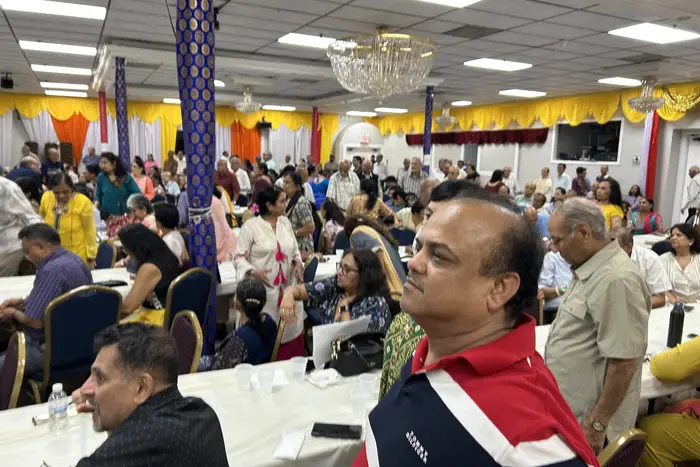Zohran Mamdani, a Democratic candidate for mayor of New York City, is generating significant attention as he seeks to become the first Asian American and Muslim mayor of the city. While his campaign has garnered support from various immigrant communities, he faces fierce opposition from some members of the South Asian community, particularly regarding accusations of anti-Hindu sentiment.
Critics have pointed to Mamdani’s policy positions and statements on foreign affairs, claiming they reflect a bias against Hindus. Notably, his comments about Indian Prime Minister Narendra Modi, whom he has referred to as “a war criminal,” have fueled the backlash. According to the Pew Research Center, nearly half of the Indian-American population identifies as Hindu, while approximately 60% of Bangladeshi and Pakistani Americans are Muslim. This demographic split adds complexity to the political landscape as the election approaches.
At a recent event at the Gujarati Samaj, a cultural center in Queens, controversial Hindu speaker Kajal Hindusthani characterized Mamdani as “a new demon” impeding Hindu aspirations for a “Ram Rajya.” In a speech to an audience of around 350 attendees, she urged them to vote against Mamdani, stating, “As long as demons are alive on earth, Ram Rajya cannot come.”
The tensions surrounding Mamdani’s candidacy highlight how religious disputes often linked to the subcontinent are influencing the political scene in New York City. As the election approaches, these divisions could significantly impact voter turnout among the city’s approximately 450,000 South Asian residents.
Mamdani’s campaign has not publicly addressed the Islamophobic attacks directed at him, which include a high volume of negative commentary from both local and international sources. A report from the Center for the Study of Organized Hate indicates that hostility toward Mamdani stems from both U.S.-based far-right accounts and those in South Asia. The report underscores how local races can resonate with broader global grievances.
Despite the criticism, Mamdani has found support among some Hindus who appreciate his commitment to pluralism. He has participated in various cultural events, including a Diwali celebration, where he spoke about the challenges facing New Yorkers in terms of affordability. “This celebration is about the triumph of light over darkness,” he told attendees, linking the festive spirit to his campaign’s focus on economic issues.
The opposition against Mamdani also comes from organized groups such as Indian Americans for Cuomo, which flew a banner over the city reading, “Save NYC from Global Intifada. Reject Mamdani.” Such tactics reflect a concerted effort to mobilize anti-Mamdani sentiments within certain segments of the Indian-American community.
Political analysts, including Sangay Mishra, a political scientist at Drew University, suggest that some anti-Muslim attitudes within the Hindu community are amplified by wider anti-immigrant sentiments. For many, aligning with a distinct religious identity provides a sense of safety in a challenging political climate. Mishra notes that “as long as you’re Hindu and you highlight your Hinduism, you won’t be targeted as Muslims.”
In light of these tensions, Mamdani’s approach to bridging the divide remains unclear. While he has expressed a desire to unify New Yorkers, there are significant obstacles to achieving that goal. His campaign did not respond to requests for comment regarding the ongoing criticisms.
Concerns over Mamdani’s candidacy have also been echoed by members of organizations like the Hindu American Foundation. Executive Director Suhag Shukla has criticized Mamdani’s language regarding Hindu American leaders, stating that while criticism of Modi is fair game, his use of terms like “extremist” and “fascist” is troubling.
Opposition has also centered on Mamdani’s support for legislation aimed at prohibiting caste-based discrimination in New York, a move criticized by groups like the Coalition of Hindus of North America. They argue that the bill could lead to discrimination against South Asians, particularly Hindus, despite the legislation not explicitly targeting any religion or nationality.
Amid the debate, some Hindu leaders, like Dr. Uma Mysorekar of the Hindu Temple Society of North America, encourage a fair assessment of Mamdani’s candidacy. She acknowledges community fears but argues that judging him solely based on his Muslim identity is unjust. “We should learn to see what he can do best for the city of New York,” she stated.
As the general election approaches in November, the dynamics within the South Asian community will be crucial. The contrasting views among Hindus regarding Mamdani’s candidacy reflect broader societal debates on identity, religion, and politics in the United States.
Despite the challenges ahead, Mamdani’s campaign continues to attract a diverse coalition of supporters who see his candidacy as a representation of New York City’s multicultural identity. For these supporters, Mamdani embodies the values of inclusivity and diversity that they believe are essential for the city’s future.
